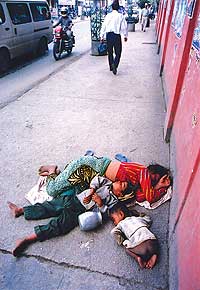The government designed the budget with an optimistic scenario of peace, not a realistic scenario of continued conflict. Nepali will pay dearly for this in 2004: many with their lives, most with plummeting living standards.
The military now bites off a 20 percent chunk of the annual budget, shrinking the slice for education to 15 percent, health to five percent and only 0.5 percent goes for drinking water.
What's worse, even these allocations haven't been sent to the districts because of security concerns. Other resources and investments that would have helped kick-start economic activity have not reached targets, especially in rural areas.
It's a vicious cycle: without basic services, most young Nepalis have only two choices: join the Maoists or migrate. Most chose the latter, and by all accounts internal displacement and migration to India has reached crisis proportions. This will seriously hurt agriculture and accelerate the slide.
"Data shows Nepal's human development and poverty reduction achievements have been sharply interrupted by inadequate and insufficient access to basic social services," says economist Bishwambher Pyakuryal.
The finance minister has been trying to put a brave face on all this by citing improvements in macroeconomic performance with a notable 15 percent increase in revenue this year. Lohani told us: "Production has gone up and so has fiscal balance and trade, we are moving in the right direction." The Nepal Rastra Bank's latest review cites exports increased nine percent compared to a 19 percent decline last year.
 But what is worrisome is that a vast majority of Nepalis are suffering from conflict, dislocation and a serious decline in incomes. The government has deployed mobile teams to take basic and even legal services to remote rural areas where government offices have closed down because of Maoist activity. Although the mobile teams get a lot of air-time on state media, it has been implemented at only a few places.
But what is worrisome is that a vast majority of Nepalis are suffering from conflict, dislocation and a serious decline in incomes. The government has deployed mobile teams to take basic and even legal services to remote rural areas where government offices have closed down because of Maoist activity. Although the mobile teams get a lot of air-time on state media, it has been implemented at only a few places. National economic prospects are no less gloomy. A FNCCI report shows 35 of the most important manufacturing industries are operating at half their production capacity. Worst hit are textiles, utensils, cement and cotton.
Still, cities are flush with cash from people who have migrated in with all their savings to flee the violence. Banks are bursting with money, with nowhere to invest. "There is a huge problem with liquidity," one senior banking executive told us. "We have too much of it."
Experience of countries like El Salvador and Sri Lanka, where civil wars were more intense than in Nepal, show that even during conflict, the government can adopt policies to reduce human suffering. "Despite the war, access to food, basic health care and primary education need not be impaired," says Pyakuryal.
For that, food and medicine should not be regarded as weapons of war. The government is under pressure from some donors to allow service delivery and relief directly to Maoist areas. After refusing point blank, there are indication officials may be relenting.
Donors go direct
Donor agencies have convinced the government to allow them to work in Maoist strongholds to take food, health and infrastructure.
The German aid agency GTZ and the UN's World Food Program (WFP) will soon launch a food security and rehabilitation project in 15 VDCs of Rukum and Rolpa. "If we go to such places under the government network, the Maoists do not cooperate, that is why we are going directly," an official said.
WFP's 'Quick Impact Program' has been going on in seven conflict and food deficit districts. "We prioritise villages with lower caste people and difficult access," said GTZ's senior regional coordinator Surya Nepal. From its new regional office in Ghorahi, GTZ will also be involved in reconstruction, irrigation and repair of roads .


